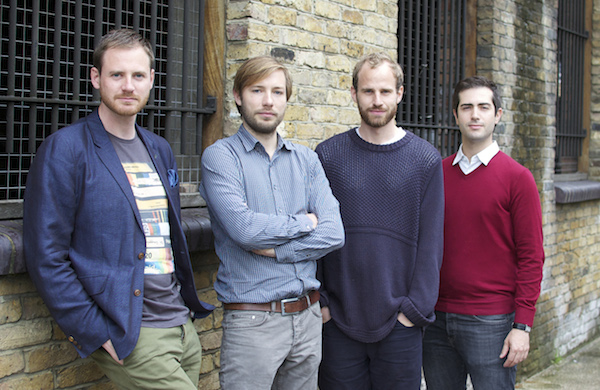Founder of new online library Bibblio, Mads Holmen, explains how the internet is transforming the way we learn

(L – R) Bibblio co-founders Rich Simmonds, Mads Holmen and Roar Knüppel, alongside the original technical architect Walter Badillo.
For as long as I can remember, I have been interested in learning. I suppose I was a strange kid. I wasn’t just fascinated with new knowledge; I wanted to go one step deeper.
My interest led me to study a communications degree, and one of our professors threw up a slide one day that resonated very deeply in me. It read something along the lines of:
“Knowledge and learning are not linear. They therefore don’t behave like physical objects. A better definition is to consider them as a filter or lens that determines the world you see.”
From that point onwards, my own approach to learning changed. If a single piece of knowledge could have such dramatic implications for the way I perceived a subject and the world itself, then surely I should be learning smarter, not just studying harder or for longer? And shouldn’t I find a unique, personalised way to find and explore my own ‘filters’, rather than plodding through one-size-fits-all education systems?
As Joi Ito, director of MIT, puts it:
“Education is what people do to you. Learning is what you do for yourself.”
This realisation inspired me to develop a new learning library based on social, curiosity-driven, non-linear learning: what I hope will become an example of the positive power of an all-too-often petty internet.
Bibblio is not setting out to compete with education at all – no more than a library competes with a university. But the internet has created an education paradox. While the price of schools and universities is rising exponentially in most countries, the cost of learning is actually trending towards zero — with a wealth of great learning material freely available online. Technology and free learning materials have the potential to level the learning field because we are increasingly able to learn anything we want, as well as choosing the content, time, teacher and device we want to learn with.
While the initial wave of Massive Open Online Courses (MOOCs) succeeded in bringing formal school and university curricula to a broader audience, they largely stay true to the traditional form and structure. You have to go to places such as YouTube, Slideshare or Soundcloud to find significant innovation.
It is outside the established institutions that the majority of new content, formats and ideas are being developed. It is here that we really truly find that “non-linear” model that my lecturer was talking about. Khan Academy and TED are obvious examples, but the truth is that there are now thousands of great learning channels scattered across the web.
One of my own favourite channels is Vsauce. Michael Stevens of Vsauce represents a new generation of creators and educators who make learning voluntary, free and social. Vsauce has more subscribers than all of the major US universities combined. The point is not that all of those seven million shouldn’t educate themselves in formal settings, but that the internet is progressively better equipped to assist a vast audience of curious individuals to aspire higher and wider than before.
In a world where degrees often get more and more specialised, it offers people a window to worlds different to their own.
And it’s here that we took the inspiration for Bibblio. Put simply, the world needs a better window. It needs a library which makes all these great things easier to find and easier to benefit from. Because: availability is one thing — accessibility quite another.
So to end where we started, my own learning path has taught me that there are many lenses available. But it is up to you to put the glasses on.
If you want to have a glimpse through my glasses, I’ve created a collection to accompany this piece, featuring nine pieces of inspirational content that best illustrate my journey about learning. Just click through here.
Did the internet expand or narrow your life today?
Words: Mads Holmen
